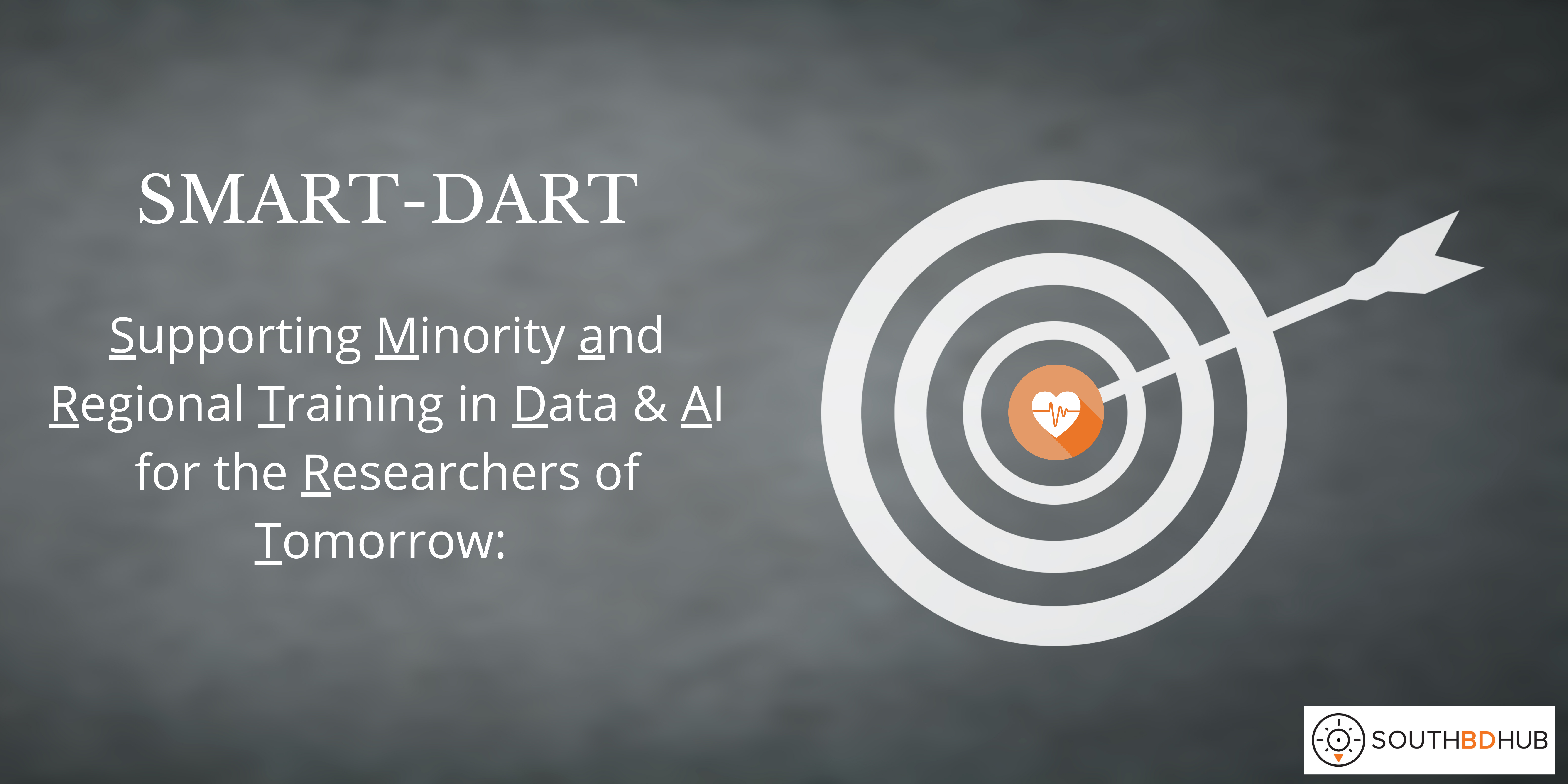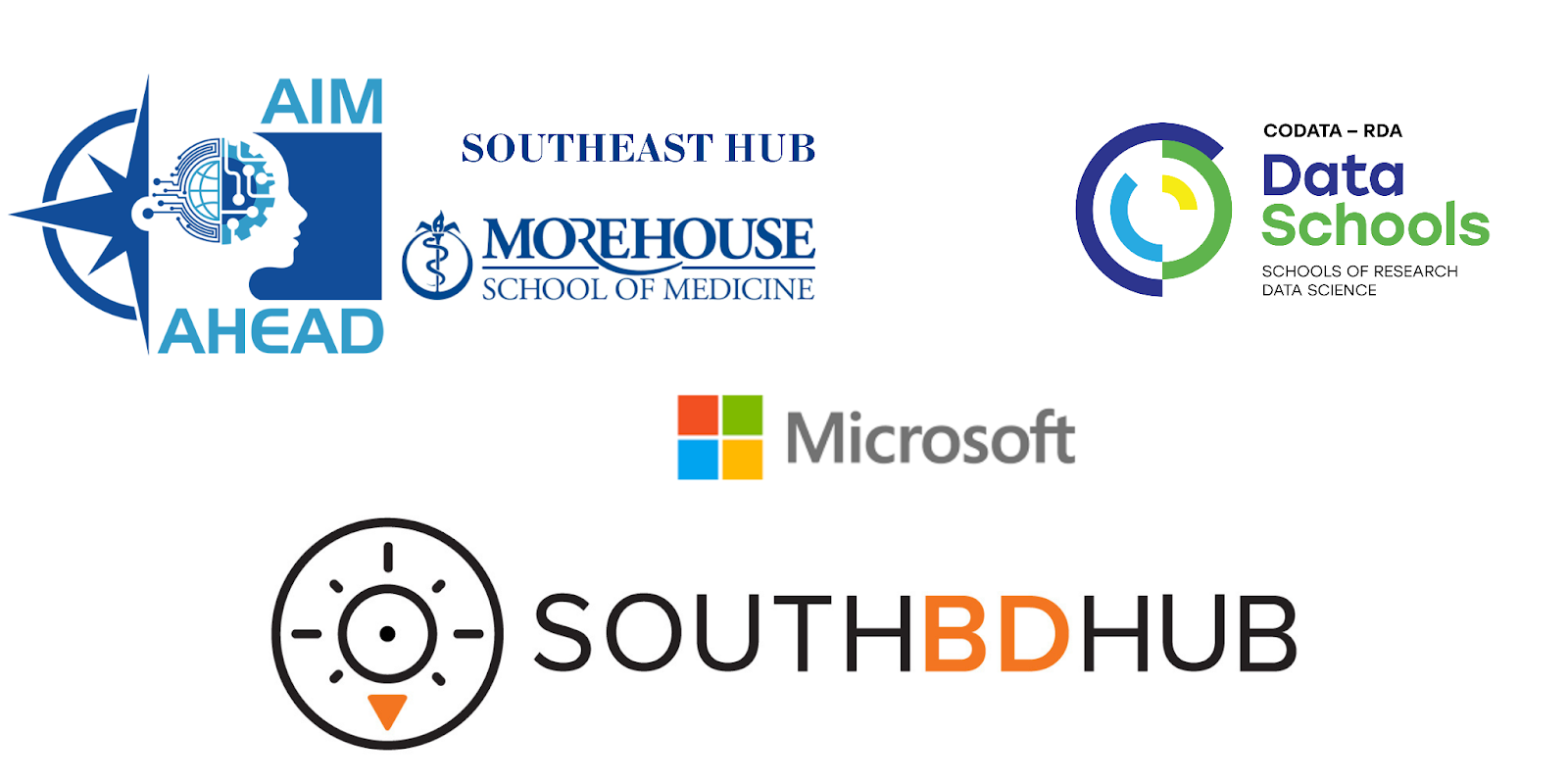
Hosted by:

SMART-DART: Supporting Minority and Regional Training in Data & AI for Researchers of Tomorrow: Equity Cohort
NOW ACCEPTING APPLICATIONS FOR 2023!
Click Here to APPLY
Program Goal:
Increase the Readiness of Health, Climate, and Social Equity Researchers of Color in the South for Artificial Intelligence and Open Data Research
Program Rationale:
The ever-accelerating volume and variety of data being generated is having a huge impact on a wide variety of research disciplines, from the sciences to the humanities. The rapid increase in the volume of data generated through electronic health records (EHR), climate sensors, food and water systems, the criminal justice system, and other social justice research presents exciting opportunities for developing data science approaches (e.g., AI/ML methods) for social justice research and improving healthcare as well as climate and food resilience.
Many challenges hinder the more widespread use of Open Data and AI/ML technologies, such as the cost, capability for widespread application, and access to appropriate infrastructure, resources, and training. Additionally, the lack of diversity of both data and researchers in the AI/ML field runs the risk of creating and perpetuating harmful biases in its practice, algorithms, and outcomes, thus fostering continued health disparities and inequities. Many underrepresented and underserved communities, which are often disproportionately affected by diseases and climate conditions, have the potential to contribute expertise, data, diverse recruitment strategies, and cutting-edge science, and to inform the field on the most urgent research questions, but may lack financial, infrastructural, and data science training capacity to apply AI/ML approaches to research questions of interest to them. This program seeks to increase the artificial intelligence and open data readiness of health, climate, and social equity researchers of color throughout the Southeast region.
Therefore, the South Big Data Hub will join CODATA-RDA, AIM-AHEAD Southeast Hub at Morehouse School of Medicine, and Microsoft to host a 10-week Researcher Data Science Training through a mix of virtual and in-person instruction. This would be the second CODATA-RDA School run in the United States and research teams from universities with the AIM-AHEAD Southeast Hub, the South Hub DataUp program and their expanded network would be invited to apply. The SMART-DART: Equity Cohort will focus on growing the competence of Health, Climate, and Social Equity researchers in accessing, analyzing, visualizing, and publishing data. It is open to participants from minority-serving institutions (MSIs), described in eligibility below. This activity will cover topics on principles and practice of Open Science, research data management and curation, use of a range of research compute infrastructures, large-scale analysis, statistics, visualization and modeling techniques, automation and scripting.
Program Description:
The South Big Data Hub will join CODATA-RDA, Microsoft, and AIM-AHEAD Southeast Hub at Morehouse School of Medicine to host a 10-week Health Equity Researcher Data Science Training Program through a mix of virtual and in-person instruction.
Who is Invited:
SMART-DART is a cohort-based program so we would encourage a cohort made out of 2-3 participants from different career stages to attend from each school. For instance, a Health equity faculty member and a Food and Water researcher could apply together as a pair. Alternatively, an early career Criminal Justice faculty member and a researcher scientist or postdoc could apply as a team. This would foster a sense of community within individual institutions. Additionally, early career participants can act as a campus or departmental resource. A target of 15 universities and 30 researchers would be selected for the program.
Eligibility:
Minority Health, Climate, and Social Equity researchers or those doing research on topics with recorded Health disparities, disproportionate climate, food or water impacts or in Criminal Justice research within the 16 states of the South Hub Delaware - Texas, including Washington DC, Puerto Rico, and the US Virgin Islands, at minority-serving institutions including HBCUs, HSIs, and primarily teaching institutions, such as liberal arts colleges and community colleges.
Health, Climate, and Social Equity Researchers are defined as researchers working on areas including but not limited to:
- Health equity studies involving electronic medical records
- Research addressing areas of Health Disparity in populations of color such as HIV, Breast cancer, Prostate Cancer, Stroke, Maternal-fetal health, etc
- Research Practitioners working with electronic medical records in medical or public health settings
- Climate equity studies involving food, water, geosciences, or environmental impacts on disadvantaged populations
- Criminal or Social Justice Research to promote equitable treatment and outcomes
Outcomes:
Our goal is to foster institutional capacity building as well as individual researcher capacity in research Data Science at minority-led, minority-serving, and primarily teaching institutions, such as liberal arts colleges and community colleges.
Program Outline: *See Detailed Curriculum Specifications in Section Below
Time Commitment: 8 weeks
Week 1: In Person
In-person content will be delivered over 2 days at The Georgia Institute of Technology in Atlanta, GA. Participant Stipends will be given to cover program participation and travel to Atlanta, GA)
Week 2- 6: Virtual (2-10 hours /week)
Week 7- 8: Virtual (2-10 hours / week)
Week 9: Self-Paced Work
Week 10: Closing Celebration (Optional)
Curriculum Specifications by Week
Applications Are OPEN - Click Here
Program Dates
| June 5 | Registration Opens |
| August 15 | Registration Closes |
| August | Announcement of Participants |
| September | Researcher Training School Begins |
| November | Researcher Training School Ends |
About Us
The South Big Data Innovation Hub is a community convener for data innovation. Our vision is to mobilize the data science community to collectively accelerate scientific discovery and innovation, spur economic development in the region, broaden participation and diversity in data science, and address societal challenges affecting the Southern United States. The South Big Data Innovation Hub is managed jointly by the Georgia Institute of Technology and the University of North Carolina at Chapel Hill, the South Hub provides critical infrastructure for the transition of Big Data to Benefits—with more than 1300+ members from universities, corporations, foundations, and cities committing their support. The South Hub serves the Southern U.S. Census Region (i.e. 16 States: Delaware - Texas, including Washington DC, Puerto Rico, the U.S. Virgin Islands, and territories). Learn more at www.SouthBigDataHub.org
Learn More About Our Collaborators
AIM-AHEAD Southeast Hub at Morehouse School of Medicine: Morehouse School of Medicine is leading the NIH Artificial Intelligence/Machine Learning Consortium to Advance Health Equity and Researcher Diversity (AIM-AHEAD) - Southeast Hub which is committed to leveraging the potential of AI/ML to accelerate the pace of biomedical innovation in the Southeast, while prioritizing and addressing health disparities and inequities. Tackling the complex drivers of health disparities and inequities requires an innovative and transdisciplinary framework that transcends scientific and organizational silos. Mutually beneficial and trusted partnerships can be established to enhance the participation and representation of researchers and communities currently underrepresented in AI/ML modeling and application, and improve the capabilities of data curation and this emerging technology. Visit their website to learn more
CODATA exists to promote global collaboration to improve the availability and usability of data for all areas of research. CODATA supports the principle that data produced by research and susceptible to be used for research should be as open as possible and as closed as necessary. CODATA works also to advance the interoperability and the usability of such data: research data should be intelligently open or FAIR. By promoting the policy, technological and cultural changes that are essential to promote Open Science, CODATA helps advance ISC’s vision and mission of advancing science as a global public good. Visit their website to learn more.
The Research Data Alliance (RDA) has a mission to build the social and technical bridges that enable the open sharing of data use and re-use. As a cross-cutting organization that simultaneously builds the data community, the RDA serves the broader research community and strengthens the integration between the two. The RDA community spans domain disciplines (genomics, marine science, agriculture, social science, digital humanities, chemistry, materials science, Earth and space sciences, biomedical and health science, etc.), information disciplines (computer science, information science, library science, archival science) and practitioners and professionals from data-focused and data-enabled organizations and enterprises. A key strength of the RDA is the establishment of global regions to support and sustain the entire system. Specific objectives of the RDA-US include building and capitalizing on expanding the knowledge of open use and re-use of data sharing within the US, supporting global operations, and strengthening the data science infrastructure community. Visit their website to learn more
The West Big Data Innovation Hub is an inclusive community for catalyzing and scaling data science for societal needs in the Western United States. The West Hub is led in collaboration across three host institutions: the University of California, Berkeley; the University of Washington; and the University of California, San Diego. Our community includes contributors and data enthusiasts from Alaska, Arizona, California, Colorado, Hawaii, Idaho, Montana, Nevada, New Mexico, Oregon, Utah, Washington, Wyoming, and a global network of partners. Visit their website to learn more
Microsoft accelerates scientific discovery and technology innovation to empower every person and organization on the planet to achieve more. We do this by bringing together the best minds across diverse disciplines and backgrounds to take on the most pressing research challenges for Microsoft and for society. Microsoft collaborates with the global research community through programs, events, learning opportunities and joint research endeavors. Visit their website to learn more
